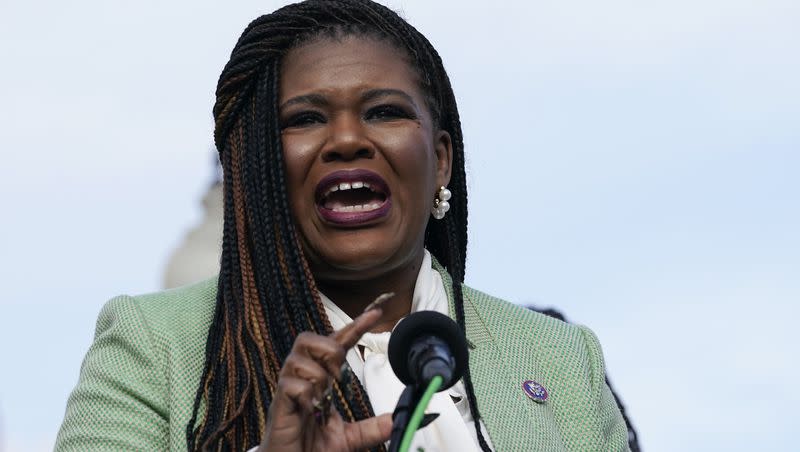House Dems’ new proposal would give Black Americans $14 trillion in reparations

Several Democratic members of the U.S. House of Representatives introduced a resolution Thursday seeking to provide $14 trillion in reparations to Black Americans.
Rep. Cori Bush of Missouri unveiled the Reparations Now Resolution in a press conference.
“We know how slavery’s impacts live on today, from the Black-white wealth gap, to voter suppression, to segregation and redlining, to disparities in infant mortality rates and other health outcomes,” she said.
“Our federal government never saw it fit on its own to rectify the immeasurable, cataclysmic harms of slavery,” Bush continued. “But we’re here now, and we’re lifting up this mirror of a resolution so that America can face it and see our future. A future of healing. A future of repair. A future of accountability.”
This resolution was co-sponsored by Reps. Barbara Lee of California, Jamaal Bowman of New York, and Rashida Tlaib of Michigan.
There is no economic justice without reparations.
I was proud to stand alongside friends, advocates, and colleagues to announce my #ReparationsNow resolution which will advance reparatory justice in this country. pic.twitter.com/WDcfYW4uh3— Congresswoman Cori Bush (@RepCori) May 18, 2023
Bush said that since the U.S. economy profited off of the crops produced by the enslaved people. “In 1861 alone, the value placed on cotton produced by enslaved Black people was $250 million, or more than $8 billion today,” she added.
The Reparations Now Resolution would disperse cash payments and make long-term investments in housing as well as education.
Her proposal comes as President Joe Biden and Republican lawmakers are negotiating how to cut spending in exchange for raising the debt ceiling.
According to NBC News, the reparations resolution also pushes for the passage of a federal bill that would commission a study and develop reparation proposals. It has been introduced in Congress every year since 1989.
Rep. Kat Cammack, R-Fla., said that this move showcases “the woke ideology peeking and rearing its ugly head,” according to Fox News.
“In this country, you can do anything, be anything, and this culture of victimhood, it has absolutely gotten out of control,” she said.
Regardless of the push-back, the idea of giving Black Americans reparations has been gaining momentum. In 2021, a city in Illinois created a reparations plan for Black residents, becoming the first city in the U.S. to do so.
That same year, California Gov. Gavin Newsom established a task force to analyze discrimination that stems from slavery.
After two years of work, the task force is expected to share its findings with the state legislature on July 1. But Newsom has yet to offer any other details.
“We need to wait for the task force to finish its work and submit its final report,” Newsom said while declining to endorse any measure, according to CNN.
Meanwhile, most Americans view reparations negatively. A 2021 Pew Research Center poll found that nearly 7 in 10 of those surveyed, or 68%, said the descendants of slaves should not get payments.
But the survey revealed a contrast when accounting for race and ethnicity: 77% of Black adults supported reparations, while 18% of white Americans said they supported the same.
The poll also found cash payments were the least popular and educational scholarships were most popular among those who support repayments.
The Reparations Now Resolution doesn’t reveal the source of funding for the $14 trillion in reparations.
“We’re still having those kinds of conversations,” Bush told Fox News.
The Republican-controlled House will make it tough for Bush’s resolution to pass. But, as she told The Root, she considers the conversations around reparations worth having.

